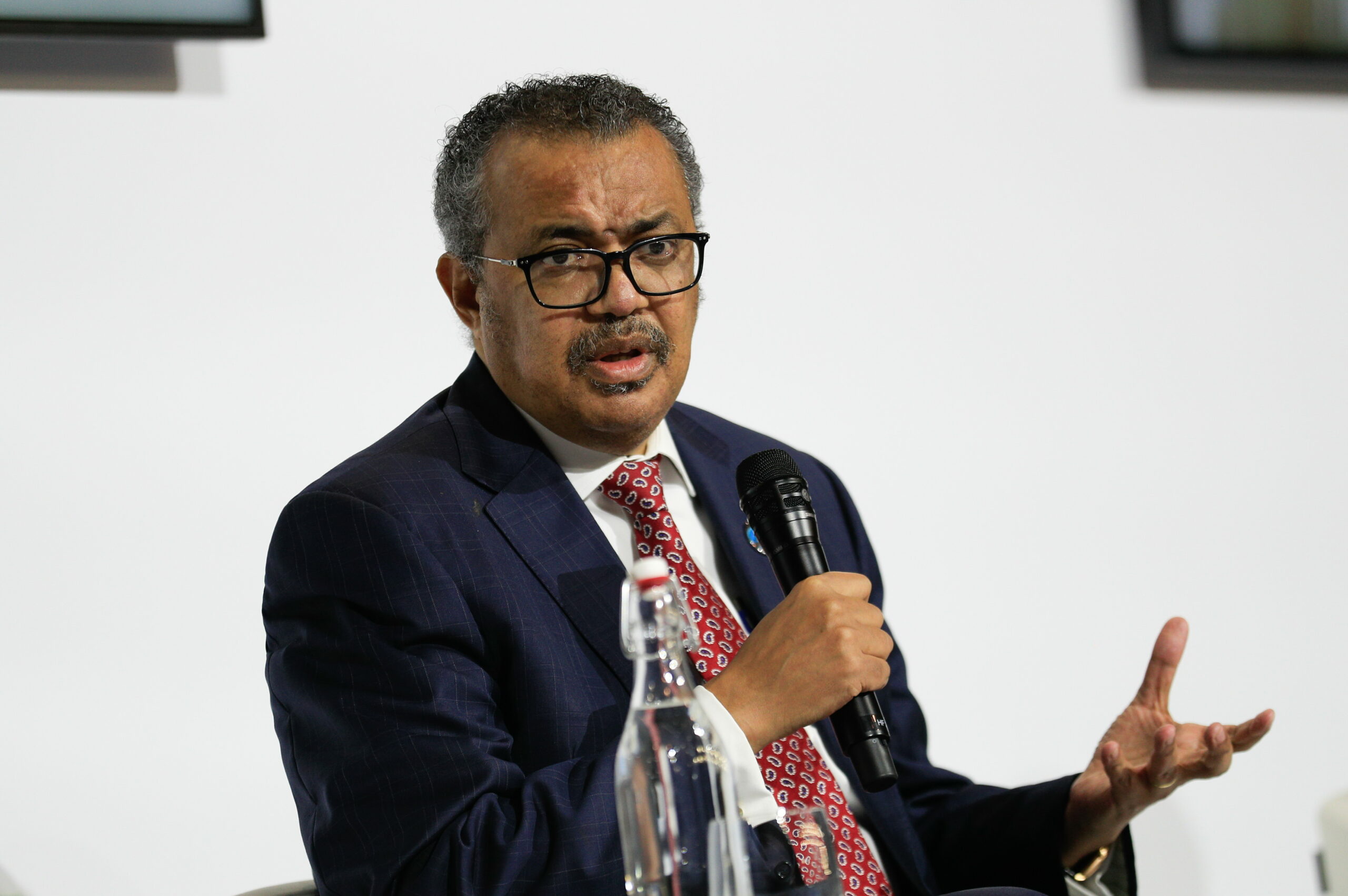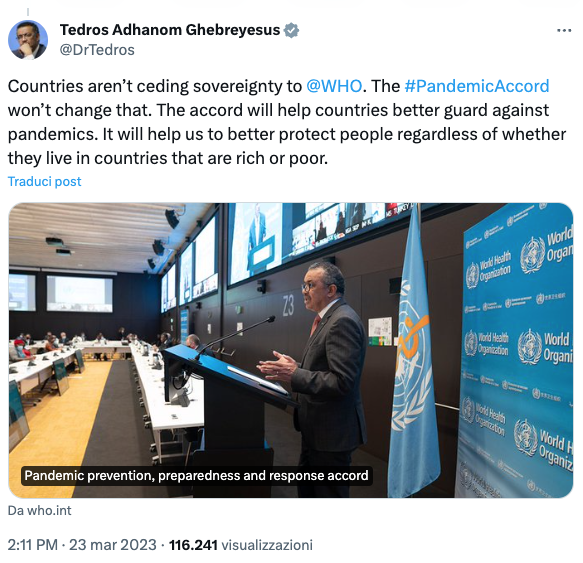Why are states dragging their feet on the WHO pandemic treaty?

Wanted by Europe and also encouraged by developing countries, the pandemic treaty supported by the WHO was scheduled for next May but states are being vague and criticism of the WHO is growing. And in Italy the League with Borghi… Facts and insights
The global pandemic treaty advocated by the World Health Organization (WHO) may never see the light of day. Almost two years after the outbreak of the Covid-19 pandemic, in December 2021, member states had committed to signing it by May 2024 but "less than six months before the deadline, countries are still not really negotiating", some diplomats report .
And while the director general of the WHO, Tedros Adhanom Ghebreyesus, urges them to act, there are those who instead ride the hesitations to launch an attack on the UN institution.
WHAT THE WHO PANDEMIC TREATY PROVIDES
After finding themselves unprepared for Covid-19, WHO Member States decided to work on a legally binding treaty on how to respond to the next pandemic, not only because the coronavirus has caused almost 7 million deaths but also because it has further worsened the conditions of the poorest countries, which were the last to benefit from scientific advances.
According to the draft, the agreement makes countries commit to monitoring pandemic threats, strengthening their response capacity and setting out what they would receive in return for sharing information on any disease-causing virus or bacteria as soon as they discover it .
The negotiations are hosted by the WHO, but it is up to member states to reach an agreement.
COUNTRIES FOR AND AGAINST
Just in 2021, Start , quoting the New York Times , wrote that "while the European Union and Great Britain have pushed for months for an ambitious treaty that has legal force, the United States, Brazil and other countries would instead like a weaker, non-legally binding mechanism for the Member States". Italy, at the time led by former prime minister Mario Draghi, had also signed the appeal.
The mastermind of the treaty, according to the manifesto , was the president of the Council of Europe, Charles Michel, who worked with France and Germany to obtain the support of the director general of the WHO "and of 25 countries around the world (The Friends of the Treaty)”. “The démarche, however – we read in the newspaper – also refers to the aspiration to strengthen a European defense of global health, between Chinese resourcefulness and the new American multilateral activism of the Biden administration, which is not particularly enthusiastic about the idea of a new treaty”.
To which we add, "the need to safeguard the mandate and legitimacy of the WHO" which saw "a plethora of new health institutions to be installed at the UN headquarters" appearing under our noses, taking away its authorities, including the Global Health Threat Council and the Global Finance and Health Taskforce.
SLOW AGREEMENTS
Although the discussion of a global pandemic treaty began more than two years ago, less than six months after the deadline that the countries had given themselves expired, "political attention has shifted to other issues and the usual compromises and concessions of negotiations internationals cannot be seen,” some diplomats involved in the talks told Politico .
“If countries… really want to have a treaty, they need to start actually negotiating, not reiterating their initial positions – said a diplomat from a developing country -. Many countries… just say 'we don't want it', but don't really engage with the text.”
The US newspaper believes that “although it is not unusual for negotiators to take their time, the scope of the text, the lack of agreement on almost all its aspects and the fact that only two official negotiating sessions remain mean that reaching an agreement on entire text at the eleventh hour would be a remarkable feat.”
Even for the Guardian , “reaching an agreement is difficult” due to “diverging government interests, reservations from pharmaceutical companies and persistent anti-WHO sentiment from those who opposed lockdowns, masks and vaccines during the pandemic”.
THE KNOWS OF THE TREATY
A recent draft of the agreement, obtained by Politico and cited in early January, indicates that the countries have changed little from their initial positions on key provisions of the text. These include intellectual property rights, sharing of information on pathogens and technology transfer.
Last August, even an organization like Doctors Without Borders – for other reasons – was not satisfied with the draft because it was "weak", written with "ambiguous language" and with criteria "too loose, so that when it comes to acting, the countries they will interpret them differently, making it difficult to activate the agreement.” Even the definition of 'pandemic', underlines the Guardian referring to MSF, "is criticized for being too limited".
According to Roland Driece , who co-chairs the negotiations, regarding the disagreements, “European countries want more money invested in pandemic prevention, while Africa wants the knowledge and funding to make them work, as well as adequate access to pandemic countermeasures such as vaccines and treatments”. Which translates into an “extreme” amount of work.
EQUITY AND SHARING SEND IN CRISIS
One of the guiding principles of the treaty, at least in intention, is the notion of fairness – that is, what was missing during Covid-19. Precisely equity, writes Politico , had made both low- and middle-income countries agree to sign the plan but, as one diplomat said, "many developing countries have no intention of signing something in the end, that does not actually provide a concrete return for equity.”
A central sticking point, the article highlights, is the so-called “access and benefit sharing mechanism,” which the pharmaceutical industry “ strenuously opposes .” The United States, European Union, United Kingdom, Canada, Switzerland and the United Arab Emirates also said they were “not satisfied with the entire article” describing it. The idea involves countries sharing samples of circulating influenza viruses with pandemic potential, which can then be used by the pharmaceutical industry to produce vaccines. In turn, the industry donates money to a fund that is used to improve countries' preparedness and response capacity.
Although, according to sources, there are also disagreements on the provisions relating to the waiver of intellectual property rights and the financing of pandemic preparedness, a diplomat from a high-income country stated that the final point on access and benefit sharing “will become one of the most important issues in the negotiation”.
THE APPEAL AND DEFENSE OF THE WHO DG
“As things stand, the world remains unprepared for the next 'Disease X' and the next pandemic. If it happened tomorrow, we would be facing many of the same problems we faced with Covid-19,” Ghebreyesus said at the World Government Summit taking place in Dubai from today to February 14.
For the DG "it is possible, or even probable, that we will have to face another pandemic in our lifetime", however, the treaty appears distant due to "delays in negotiations and a generalized mistrust in the WHO".
WHO ACCUSES THE WHO
The institution has ended up at the center of numerous controversies, from the former president of the United States, Donald Trump, who withdrew his country from the organization to Elon Musk who lashed out against the idea of a pandemic treaty, to which Ghebreyesus himself responded via X. According to the billionaire it would in fact mean handing over sovereignty to the WHO.

In politics they have also openly sided against the Dutch MEP Robert Ross of the Group of European Conservatives and Reformists, which the Brothers of Italy also belongs to; the Brexit leader Nigel Farage and, finally, the Northern League economist Claudio Borghi ( very close to the Northern League leader, Matteo Salvini), who explained in ten points "why the WHO must be stopped", in a sort of social campaign launched by the senator of the League who is very critical of the expenses and actions of the World Health Organization.
MUST WATCH:
The #WHO is pushing for a Global Pandemic Treaty.
In 3⃣ minutes, I present you 3⃣ reasons why this would endanger our freedom and our democracy.
Please share this video. And please e-mail it to your elected officials. We cannot allow this to happen: https://t.co/VNEW5yCtGd pic.twitter.com/D0EtjEv1GK
— Rob Roos MEP
(@Rob_Roos) May 24, 2023
The Global Pandemic Treaty is a danger to our national sovereignty. Say No the WHO. pic.twitter.com/skTJNEIQ9A
— Nigel Farage (@Nigel_Farage) May 26, 2023
10 REASONS WHY THE WHO MUST BE STOPPED
1) The WHO is of NO use. It made sense in 1948 when information about epidemics arrived by telegraph. We are now in an infodemic. During covid the WHO did not provide a single useful piece of information.
If… pic.twitter.com/MRSMcrbOXQ— Claudio Borghi A. (@borghi_claudio) February 11, 2024
GHEBREYESUS' RESPONSE AND CONSPIRACY THEORIES
During the meeting in Dubai, Ghebreyesus reiterated that "the agreement will not give the WHO any power over any state or individual" just as "the WHO has not imposed anything on anyone during the Covid-19 pandemic".
According toconspiracy theories spread online , in fact, in addition to taking away sovereignty from individual states, the treaty would give the Organization the most varied powers: from that of deploying troops to the obligation to be vaccinated, up to monitoring people's movements.
This is a machine translation from Italian language of a post published on Start Magazine at the URL https://www.startmag.it/sanita/perche-gli-stati-traccheggiano-sul-trattato-pandemico-delloms/ on Tue, 13 Feb 2024 06:50:32 +0000.

